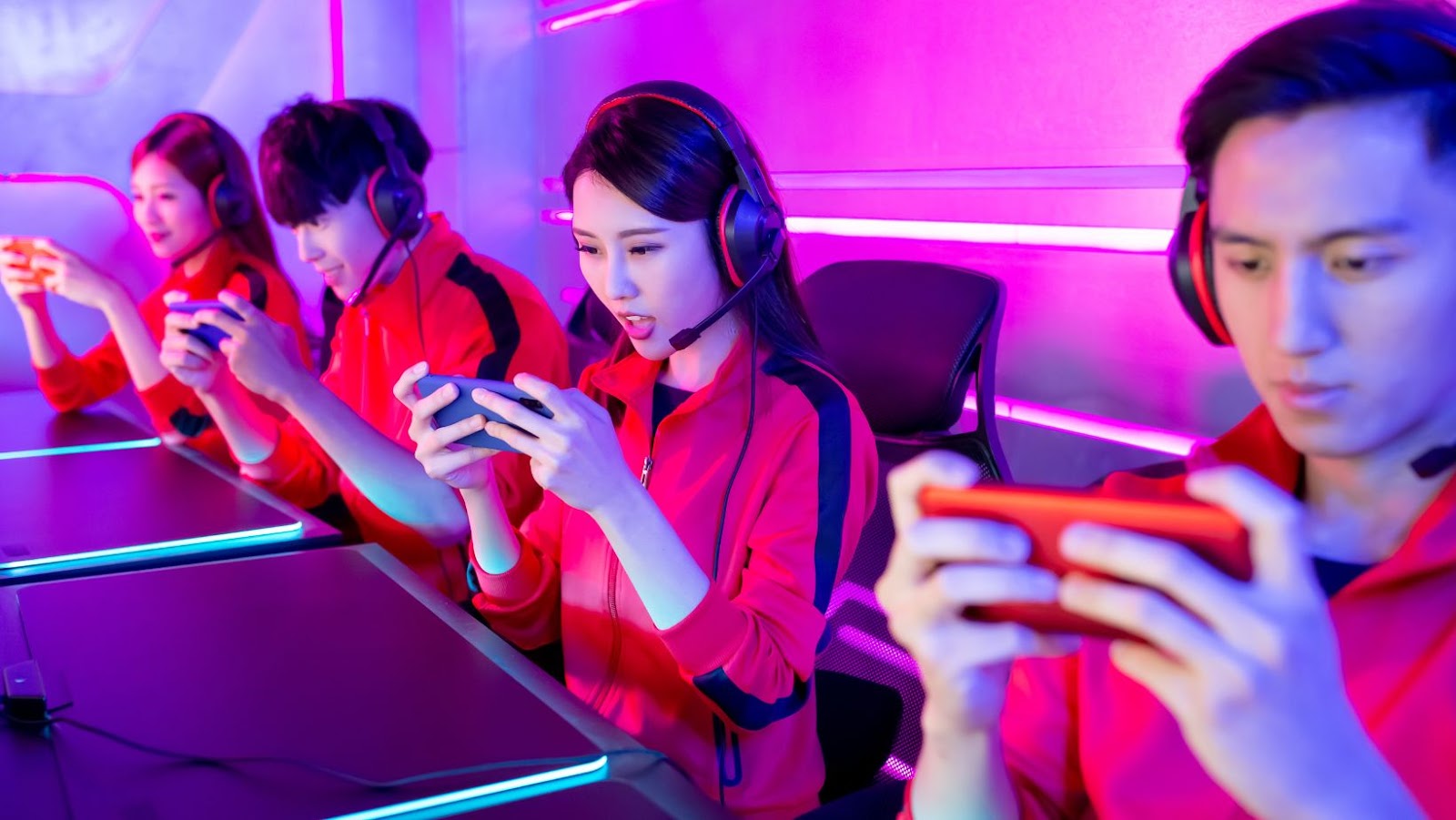
The growth of esports over the past few years has created a phenomenon that has resulted in millions of spectators across all parts of the world, who follow and watch digital games as if they were sporting events. This has created an international debate around whether esports should be integrated as full-fledged sports in the Olympics.
The International Olympic Committee (IOC) is aware of this potential integration and has been observing it for some years, leading to its formation of an Esports Liaison Group (ELG) in July 2018. The ELG is composed of members across the Olympic Movement to explore potential paths toward integrating competitive gaming into the four-yearly cycle of Games. The group would also look at how virtual ways may impact sports participation more widely by examining new formats that could utilize technology to blur the lines between “real” and “virtual” sport experiences.
In part due to its widespread appeal, esports may prove to be a vital key for engaging a younger demographic with traditional sporting values and offer an attractive opportunity for brands seeking to reach them. This could be especially positive for emerging nations who may lack access to traditionally expensive funding options available from established sporting organizations or federations.
It will be interesting to see how this debate evolves over time, with progress likely dependent on increased communication between parties with conflicting interests in terms of rules changes, organization issues, broadcasting contracts and technical standards among others each being important factors warranting discussion before any potential integration into future Olympic programmes can become a reality.
Reasons Why Esports Should be in the Olympics
Esports have been around for more than 25 years, evolving from a simple pastime to organized multi-million dollar industries. Esports has spread from PC to console, and from LANs to live tournaments that take place around the world.
Esports has grown in popularity each year and is becoming a staple of many households. Let’s take a look into the history of esports, and understand why it should be considered for integration into the Olympics.
Rise in Popularity
In the last decade, esports has seen a meteoric rise in popularity internationally. Global esports revenues have grown from US$194 million in 2012 to US$906 million in 2018 and the global esports audience has nearly doubled from 215 million in 2015 to 380 million viewers in 2018. This growth is driven by the availability of digital platforms that have allowed for increased streaming of events, as well as increased investment from tech companies and traditional media organizations.
Further prevalence of competitive gaming on digital platforms such as Twitch, YouTube and Facebook has also helped to drive wider awareness and further generate interest in professional gaming leagues such as ESL Pro League and Overwatch League.
The majority of professional gamers are categorised into four genres: fighting games (such as Street Fighter and Tekken), real-time strategy (Starcraft II, Warcraft III or Age of Empires II), sports titles (FIFA Series or Madden NFL Series) and first-person shooters (Counter-Strike: Global Offensive, Overwatch). Growing prize pools for tournaments across these different kinds of genres are driving larger audiences and more players towards competitive gaming.
Furthermore, integral endorsements by huge brand sponsorships such as Coca-Cola, Honda Motors or Intel have helped legitimise the sport with increased investment being pumped into events; providing greater incentive for players to compete because they can now generate income through placing highly at tournaments. Consequently, this has given rise to an international scene where professional playing is more widely accepted by traditional sports fans – presenting Esports with a viable opportunity to be integrated into mainstream sports leagues like the Olympic Games.
International Recognition
Esports have been around for a long time, with the first professional gaming tournament held in 1980. With the growth of technology, the esports industry has expanded rapidly, with more and more people taking up competitive video gaming. The industry has seen double digit growth in viewership each year and is now one of the fastest growing sports in the world. Mirroring traditional sports, esports have also seen international recognition, with countries like South Korea and China setting up professional leagues and tournaments.
Recently there has been an increased interest in bringing esports onto a global platform. Several countries, including France and India, have proposed that competitive video gaming should be included as events at the Olympic Games. Although this initiative does not currently have official support from the International Olympic Committee (IOC), it is gaining traction amongst sports fans around the world who are excited about seeing video games being represented on a global stage.
The incorporation of esports into major sporting events would give significant recognition to competitive video gaming as a legitimate sport and will open up numerous opportunities for players to compete on an international level while inspiring others to take it up professionally. Such an inclusion into traditional events will also provide competitive players with an added boost and may even open doors for sponsorships by big entities looking to tap into this ever-growing market segment. However, all these possibilities depend heavily on whether or not there is affirmative action regarding further acceptance of esports as part of mainstream sporting initiatives in 2021 and beyond.
Reasons Why Esports Should be in The Olympics
As gambling and video gaming become increasingly popular in the world today, there is a strong argument to be made for esports to be included in the Olympic Games. The National Olympic Committees of many countries already recognize esports as a discipline, making it a viable option for inclusion.
This article will discuss the potential benefits that would come from having esports integrated into the Olympics.
Inclusivity
Esports bring people together from all different backgrounds to compete in an inclusive and collaborative environment. Not only is this beneficial for players, but it can also help create a more unified global community. Additionally, it has the potential to reduce existing mental health issues among gamers and provide an outlet for players to express themselves and gain recognition for their achievements. Through esports, the Olympics could foster inclusivity on a global scale, leading to acceptance of all types of players regardless of age, race, gender or religion.
Furthermore, the Olympics encourage healthy competition amongst its athletes. Esports are no different; according to research conducted by The International e-Sports Federation (IeSF), “esports promote fair play, ethics and excellent sportsmanship” which can be beneficial in supplanting the growth of healthier and safer communities around the world. With its growing success and prevalence on a global scale, esports can now offer people from different countries an opportunity to engage with each other in an Olympic setting. Its potential as a sport could ultimately build bridges between athletes from rival countries who would have never otherwise connected.
Finally, esports should be included at the Olympic Games not only because it is seen as a form of entertainment but because it has become much more than that – gamers have used their skills in competition to acquire scholarships as well as profitable jobs after college or university. This realization has opened up opportunities for younger generations who look up to professional gamers competing internationally at prestigious events such Tournaments such as: The League Of Legends World Championship, The Dota 2 International Championship, Faze Clan V Game Battles etc. Such opportunities represent not only a source of motivation for gamers but also real opportunities that can make major differences in their lives.
Relevance to a Modern Audience
As the focus of wider global sporting events has shifted towards a more modern and diverse audience, so too should the Olympics embrace Esports.
Esports is as relevant as ever to an audience that is accustomed to digital entertainment and video games, with organizations such as Activision Blizzard even sponsoring scholarships for gaming. In 2017, Esports was a part of the Asian Indoor Games in Ashgabat, Turkmenistan – and if this success continues at other International sporting events then there would be no reason not to see it integrated into the Olympics.
Esports could bring in millions of viewers from across the world and captivate them with exciting competition; it would also represent a diverse range of athletes from different backgrounds – something which the Olympics have long supported and encouraged. This opens up further opportunities for representation of different cultures internationally and promotion of more positive messages to a larger demographic than ever before. Coverage on television, newspapers and online websites means that there is potential for advertisers to target these massive new audiences – giving them an opportunity to capitalise financially which could be reinvested back into Olympic sports.

Furthermore, Esports requires significantly less physical exertion than many other Olympic events which makes it much more accessible to even inexperienced or disabled athletes who wish to embark on their own Olympic journey. With multiple styles across a variety of platforms such as PC, consoles or mobile gaming – there are now near-endless possibilities for integration into the Olympics without forcing one specific sport on viewers.
Economic Benefits
Esports’ integration into Olympic Games would bring obvious economic benefit to the host countries in the form of tourist arrivals. With the growth of esports industry attracting more and more global attention, fans of different nationalities are likely to travel to the host city for a unique experience. On average, international tourists spend $3,811 per person while they visit a country which is almost twice as much compared to other tourism industry spending. The amount spent outside of hotels and on shopping is twice as much. The economic footprint with tourism spending directly affects employers, employees and many local suppliers in terms of hiring extra workers or creating new products or services that are tailored to visitors’ needs. Furthermore, cities like Tokyo have already begun investing heavily in public Wi-Fi networks, cutting down international data costs for visitors coming from abroad and potentially becoming one reason why it was chosen as the host for 2020 Summer Olympics games.
The Olympic Games are an international event that brings global attention to its host city making it an ideal opportunity for local banks, tech startups, IT companies or any other type of businesses from the same region to benefit from the increase in interest related to this particular event also boosting their own brand awareness among other opportunities within various markets. As esports become widely accepted by a massive number of viewers worldwide – both casual viewers as well as professional gamers – there is a great potential for developers behind these popular games such as League Of Legends or Starcraft2 and many others doing collaborations with well-known global brands further helping to support economy in its host cities.
Challenges of Integrating Esports Into the Olympics
The esports industry is growing at a rapid pace and its integration into the Olympic Games could bring many benefits to both the Olympic Games and esports itself. However, integrating esports into the Olympics is not without its challenges.
This article will explore the potential issues of including esports into the Olympic Games, such as safety concerns, game selection, and competitive fairness.
Lack of Regulation
The lack of regulation in esports raises questions about the potential risks of integrating it into the Olympics. The most significant challenge is to ensure that tournaments remain fair and free of cheating, doping, or any other forms of match-fixing. Referees and supervisors need to be trained and appointed to ensure gaming rules are observed while referees must also be motivated to ensure accurate calls.
Another concern is that final result or rankings may not be known until much later if cheating has taken place in the form of intentional slow elo boosting to gain advantage in competition. There have been reports that players use virtual items, account gold, etc. to gain an edge over their opponents. Moreover, third party platforms such as betting sites can cause further disparities among players when accessing resources for extra advantages or advantages are earned by cheating with money or items from another game.
Integrating esports into the Olympics would require effective regulation from policymakers and compliance from game developers concerning these issues. The Olympic Esports Federation is developing a comprehensive set of anti-corruption policies to prevent deception and fraud from occurring in competitive gaming platform events so that fairness and respect prevail during competition.
Risk of Cheating
When considering the challenges of integrating Esports into the Olympic Games, one of the most pressing issues is that of cheating, especially in games with a high skill ceiling and complex rule sets, such as Counter-Strike: Global Offensive, Dota 2 and Overwatch.
The traditional methods of vigilance used to prevent doping, such as drug testing and surveillance are not practical for Esports. Instead, developers have had to rely on digital anti-cheating software such as Valve’s VAC (Valve Anti-Cheat) system. However, cheating has still been an issue with more sophisticated players able to evade these systems by using sophisticated methods like spoofing or account sharing.
The International Olympic Committee (IOC) has made it clear that any form of cheating will be taken seriously should the IOC decide to integrate Esports into the Olympic Games. A strict zero-tolerance policy towards cheating would need to be implemented in order to keep the Esports events fair and enjoyable for viewers. In addition, organizers would also need to develop a system for verifying player identities in advance of competition — something that may prove difficult if some players choose not reveal their real life identity.
Lack of Physical Activity
The lack of physical activity is one of the major issues facing the integration of Esports into the Olympics. While playing a video game does require hand-eye coordination, it does not demand physical exertion or skilled manipulation of an object in the same way as traditional sports. This could limit the level of excitement and enjoyment for spectators as compared to watching traditional sports.
Another concern is that competitive gaming does not involve any teamwork, making it a far less appealing proposition for Olympic viewers. Teamwork has been a fundamental part of Olympic sports since its inception and team spirit is one aspect that would be missing in Esports competitions at the Olympics.
Furthermore, there are doubts regarding whether Esports meets the criteria outlined in Olympic regulations. According to those regulations, “The practice mentioned in Rule No. 2 (Sportsmanship) must promote physical health, strength and proper technical skills” which means that competitive gaming might not be able to pass this criterion for inclusion into the Olympics due to its lack of physical activity involved.

Finally, some argue that integration of Competitive Gaming may lead to junk food consumption and reduced physical activity among young participants which would damage their health overall. This could conflict with Olympic values and messages on promoting healthy lifestyle practices; as well as its own Values Education Programme which encourages athletes and spectators to respect each other’s differences while celebrating them at the same time on a global scale.
Conclusion
In conclusion, the integration of esports in the Olympic Games could be an opportunity to broaden the appeal and viewership of the Olympics to more teenagers and young adults. Though there are many legal and logistical issues involved, these issues could be addressed with proper planning.
The initiative would also involve incorporating esports-related activities such as competitions, media coverage, sponsorships, collaborations with gaming companies and promotion through physical gaming stores. With proper implementation, it should be possible to include esports in the Olympics without detracting from its traditional offerings.
Ultimately, a successful integration of esports in the Olympic Games would create a platform for young gamers from around the world to represent their countries at an international level.




